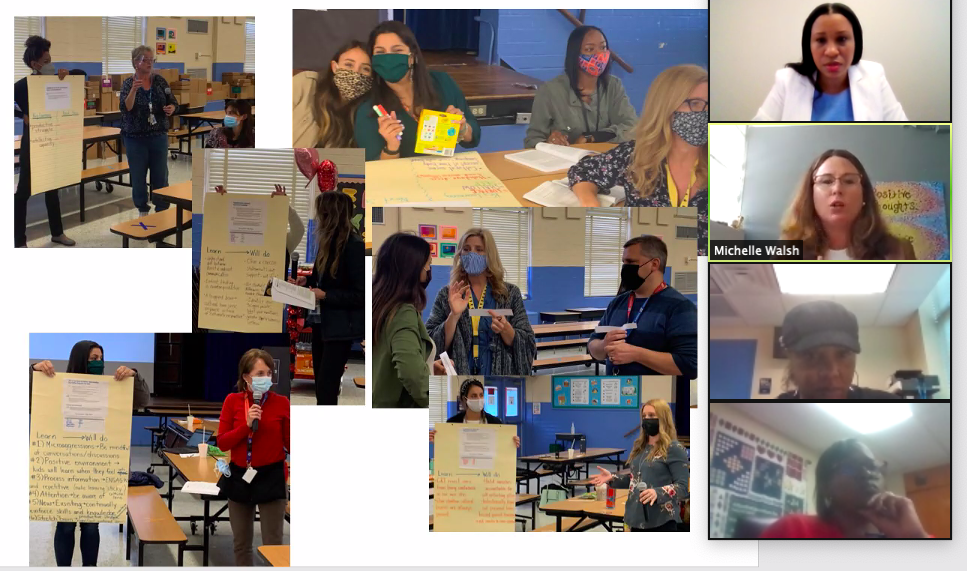School leader spotlight: Culturally responsive teaching at Lake Lucina Elementary
JPEF provides professional learning, coaching and grant funding to Principal Michelle Walsh through our School Leadership Initiative.
4/16/2021

Michelle Walsh is the principal of Lake Lucina Elementary in Arlington. This year, she was selected as a Cindy Edelman Fellow for Teacher Recruitment and Retention in the JPEF School Leadership Initiative.
As part of that work, she receives ongoing professional learning, coaching and funding to pursue an impact project of her choosing. Her work focuses on offering research-based professional learning for teachers as part of an effort to move her school to a “B” or “A” school grade.
Principal Walsh is fascinated by the brain science of teaching – so she chose to focus on Culturally Responsive Teaching, a research-based approach developed by Zaretta Hammond that emphasizes getting students in an “academic mindset” - ready to learn.
Principal Walsh has a three-year plan to bring this learning to practice in her school. She started this year, and is looking forward to seeing the results of her efforts when the results from her school’s 5Essentials Survey are available.
Here’s what she’s done so far, step by step.
- First, she set up a TEAMS space for professional learning on culturally responsive teaching. She made the schedule and the structure visible to teachers on this site. She used required faculty meeting time to lead the sessions on a monthly basis. Each session was focused on a different chapter of the book, Culturally Responsive Teaching.
- To kick off the program, she wanted to get staff in the right mental space to be open to learning and discussions about culture and race. So she led the faculty through a privilege walk. This activity made visible how differently members of the faculty grew up – and how many different advantages and disadvantages their team experienced as children.
- The faculty looked at their own school’s data on the University of Chicago’s 5Essentials Survey. In particular, Principal Walsh wanted faculty to see a discrepancy in student and staff responses: Teachers rated the quality of instruction much higher than the students. “We were saying we’re giving great instruction, but the students weren’t saying the same thing,” Principal Walsh said.
- Teachers were able to join discussions on different topics in the book, giving them more choice and engagement in the learning. They learned about “amygdala hijack” – when trauma and fear take over students’ brains and make it hard for them to learn – as well as topics such as neuroplasticity, how children remember, cultural differences, and how to minimize teacher talk and maximize student talk.
- The school implemented a clicker system, where students can give immediate feedback on their learning.
- Principal Walsh put up posters about what they were learning in the teachers’ lounge. “I wanted this work to be a conversation that wasn’t just once a month; it was always on your mind,” she said.
- Principal Walsh teamed up with her school’s Teacher of the Year, Kimberly Parker, who is a fellow in JPEF’s Teacher Leadership Initiative, to work together on their impact project. Ms. Parker and a team of five other teachers at the school were awarded the Cindy Edelman Excellence in Teaching Fellowship to accelerate their work to become a social justice model school using culturally responsive teaching practices. The teaching team will travel to Washington, D.C., to visit a social justice school and attend a national conference to further their professional learning on this topic.
Principal Walsh said one of the most helpful things about JPEF’s support of her work has been the flexible funding – she was able to buy the books for the learning sessions right away. Then, she has put funding toward healthy snacks – like Tropical Smoothies, a hit with the teachers – that has helped make teachers look forward to the sessions.
“We’re excited about the work,” Principal Walsh said. “We have a lot going on, and a lot more learning ahead, but we’ve really had a great launch. I’m excited about the 2021 results.”